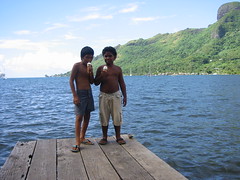(*My friend Jim K. says I don't update my blog often enough, which is true, so this one is dedicated to him.)
If you're never read any of his work, then you owe it to yourself to check out the novels and short stories of Japanese writer Haruki Murakami. To date, he's had about 14 translated stories published in The New Yorker alone, including one last week entitled "Where I'm Likely To Find It." Most of his stories have a surreal quality, somethinng akin to magical realism but with a decidedly Japanese twist that seems far removed from that of Latin American master Gabriel Garcia Marquez. In Murakami's novel "The Wind-Up Bird Chronicle," for example, the main character spends at least 50 pages existing at the bottom of a dry well only to eventually be brought inside from underground into a mysterious other world. I think that's an accurate description--it's been a few years since I read that one. You get the idea. Strange things happen, often involving elevators, dry wells, and even men in sheep's clothing, so to speak.
I first heard about Murakami-san right around the time that "Wind-Up Bird" came out in English, which was 1997. I wish I could recall the circumstances better. I lived in Seattle at the time (now I live in Oakland), and I had a habit of checking out author readings at Elliott Bay Books in Pioneer Square. Something told me to go hear this Japanese writer, Haruki Murakami, when I saw that he was reading there. Maybe I had read about him in The New Yorker, to which I have subscribed since around 1992. The date was Monday, November 24 because I still have the red ticket stub--tucked into my hardback copy of "Wind-Up Bird" and torn in half so that it reads, "Haruki Mura..."
The basement of Elliott Bay where they hold their readings filled up quickly that night, but I got there early and found myself a good seat to the right of the podium, next to an attractive Japanese graduate student from the University of Washington. I found this out later because she very politely explained to me just how huge Murakami was/is in Japan--probably their most famous and beloved modern author (along with Kenzaburo Oe, I'd say). The crowd that night was divided almost exactly in half between somewhat casual American readers and hardcore Japanese fans.
When Murakami was first introduced and stepped up to the microphone, I was almost underwhelmed by his modest presence. He is not very tall, and he carries himself with a very calm, humble bearing. He seemed almost shy, in fact, but I think part of this was his reluctance to speak English in front of a large crowd. At any rate, he didn't have to do much to win the audience over, and soon he was reading from the first chapter of his novel in Japanese, which was to be followed by a short reading of the same material in the translated English. His English was fine, but he apologized repeatedly for not being more fluent.
Now we get to the truly funny part of the evening. As he read aloud in Japanese, one familiar word kept popping up that made sense to those of us who only understood English in the audience--"spaghetti." The chapter is about a man cooking pasta and receiving an odd phone call, and as he read he kept occasionally repeating the word "spaghetti" over and over, to the point that I could honestly sense in half the audience this anticipation for the next time he would say that one familiar word, "spaghetti." At the end of this reading, everyone applauded wildly, and then he read in English and we could put our new favorite word, spaghetti, into context with the rest of the story--"Ah, it's about a guy cooking a spaghetti dinner by himself," we collectively thought.
After this reading he took questions from the audience, and about this time poet Tess Gallagher stood up from the middle of the audience and paid tribute to the friendship forged between her late husband, the writer Raymond Carver, and Murakami. Murakami had translated many of Carver's stories into Japanese and made Carver's work quite popular there, and during the translation process the two men had become very close friends, she said. Murakami was again very humble about all of this, but it added a nice local literary connection (Carver lived and is buried in Port Angeles, WA).
When the reading was over, I bought a copy of "Wind-Up Bird" and thought about having it signed by the author. However, his excited Japanese fans had already rushed to the front of the line ahead of me, making it quite long. I hadn't eaten dinner yet and was experiencing serious low blood sugar, so I shot up the stairs and went out into the Seattle night looking for a quick meal. Of course, in hindsight, I would give anything now to be able to go back and have Murakami-san sign my book for me. I have never had an opportuntiy to see him read again. I realize now how rarely he travels the U.S. book tour circuit. I've just had to content myself ever since by reading all of his books that have been translated into English, the latest of which is "Kafka on the Shore" which I bought when it first came out but haven't delved very far into yet.
Incidentally, his only stab at straight realism is "Norwegian Wood" (a huge bestseller everywhere) which is a love story set in the late 1960's when Murakami was in college in Tokyo at Waseda University. I like all of his books, but my favorite will probably always be "Wind-Up Bird" and the first collection of short stories "The Elephant Vanishes" because those were the first things I read. I also highly recommend "A Wild Sheep Chase" as a good place to start with his work.
In parting, I have to say that I'm haunted by Murakami's account of how he first knew he could write a novel when he saw Dave Hilton, an American player, hit a double during a baseball game at Jingu Stadium in Japan. I'm still waiting for my similar moment of epiphany, although I've always thought I would some day be a writer, ever since I was about 7 or 8 years old. Anyway, the novel Murakami wrote after this insight was "Hear the Wind Sing" which is almost impossible to find in English (although I have a Kodansha copy). The first lines in it are a quote from a fictional writer mentioned in the story:
"There is no such thing as perfect writing. Just like there's no such thing as perfect despair."
Link





